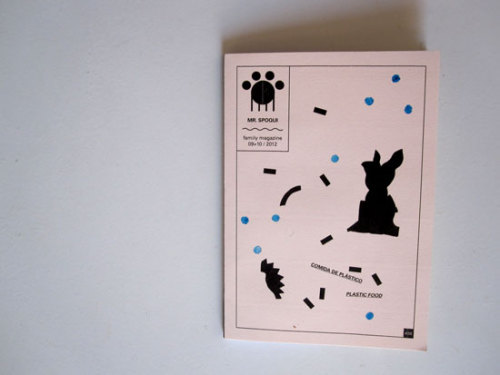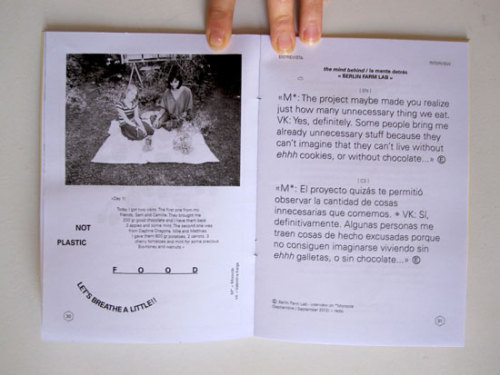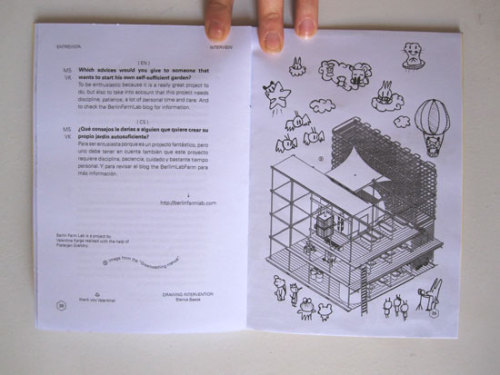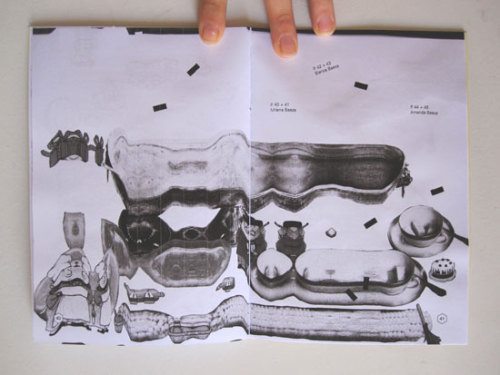Mr. Spoqui is a Portugal based family zine. Its creators are four siblings: Tiago (13), Bl
Mr. Spoqui is a Portugal based family zine. Its creators are four siblings: Tiago (13), Blanca (16), Milena (19) and Amanda (21). This issue’s topic is “Plastic food” and I was happy to do an interview with them. 1. How did the idea of Berlin Farm Lab came out? BFL is a realization of a dream. As my thesis for the school of architecture I designed the, at that time called “Greenwashing manual”, and Berlin Farm Lab is the realization of that design. After I graduated from architecture I received a grant from the Graduate school of the university of the arts in Berlin to continue my research on self-sufficiency and really apply practically what I learn. My thesis is a manual for a DIY system that you can apply to your place to live a bit more (or, totally, if you want and can) self-sufficiently that can be adapted to space, needs, aesthetics, budget, climate, local resources. So, I got this manual and scaled down to my personal needs for the summer time in Berlin (the winters here here are too cold to grow food), and now I am building it, step by step. I don’t know many architects who materialized their thesis, so I consider myself very lucky. It’s a two-year’s plan, so last year I managed to be one month totally autonomous regarding food, but next year I plan water and electricity. 2. What we can find in your garden? My garden is mobile. It changes place and content every year. This year it was in the garden of my friends’ Raphael dead grandpa’s house and I now I am looking for a place for next year. There you could find historic shorts of potatoes, tomatoes, carrots, beets, onions, strawberries, spinach, swiss chard, kale, a variety of herbs, fish, a compost toilet, a solar cooker, a rocket stove, a semi-finished biogas digester and my humanure in the state of composting. 3. What were the limitations (but specially) the challenges of the project? The biggest limitation is the constant need of the human person to take care of the system. The lifestyle of self-sufficiency can be urban (accepting also the fact you may have to move it every year) but is not compatible with a nomadic lifestyle. After I install the system for that particular summer months you I want it to run, I cannot leave anymore. This year I left one week to visit my family and all my fish died. There was a technical complication and there was no one there to solve it. 4. What was the most incredible experience during this experiment? Hard to choose one. I would say the most fascinating part was from the harvest to the table in 10 minutes. I found incredible the experience of harvesting, cooking and eating there, on the spot. It reminded me of when I was a kid in my grandparents’ garden; I would cut a tomato and eat it just like this. 5. The past Saturday (15th of September) was your last day of the experiment in the garden. How do you feel about the result? I felt really healthy eating all these fresh organic vegetables from the garden for 30 days. And the social aspect of the project filled me with a lot of positive feedback, which is exactly what I need to go on. 65 people came by and exchanged products and stories, which made the garden, become more like a social space at the end. That was an aspect I didn’t plan and I didn’t control; it just happened and evolved. I am happy to go back home and order pizza some days I have much to do and no time for cooking, but on the other hand my diet is not as perfect as in that month. I already feel the difference in my body and miss my own vegetables. The ones from the super market are not as appealing. 6. Which direction is going to take this project now? Now I am back in my office in the graduate school together with my biogas digester that I am still trying to optimize. I am producing a small publication about the 30 days in the garden, which is going to be published by crap is good press, I am continuing the research on self-sufficient systems and I am trying to find a new home for my project. All this until March. From April and on I will start again the same experiment but more complete; I want to include self-sufficiency on energy and water. And then live 60 days totally autonomous. 7. After your personal experience, what advices would you give to someone that wants to start his own self-sufficient garden? To be enthusiastic because it is a really great project to do, but also to take into account that this project needs discipline, patience, a lot of personal time and care. And to check the BerlinFarmLab blog for information: www.berlinfarmlab.com 8. What do you think about actual alimentation patterns? I wouldn’t worry so much about chemicals and junk food. Of course they are still everywhere but I am quite hopeful that the way society deals with food is changing. Thanks to the internet, food awareness is raising and people are rediscovering how they like their food. Too many options and too much information though can cause confusion. If during the 90’s we had the junk food problem, today we have the opposite extremes; for example raw-foodism or any other of these dogmatic alimentation ideas. Eating exclusively raw-food as a manifestation of being super healthy is equally problematic as eating junk food, maybe even scarier because it’s a well though action that requires a lot of effort and knowledge. My interest lays more to the contemporary foodie model. They know a lot about food and they prefer more original well-cooked comfort food rather than gourmet extremities. They love organic farmer’s market, slow food, and experimenting at home with a bit more complex cooking processes: making fresh pasta, cheese, brewing beer, making your own soya sauce, ice cream, even chocolate are some examples. It is amazing how much information you can find on the web for such “unusual” cooking processes. I think I am talking more for a combination of the foodie and the maker subculture. Thank you Amanda! -- source link
Tumblr Blog : valentinakarga-blog.tumblr.com
#interview#mr spoqui#plastic food



